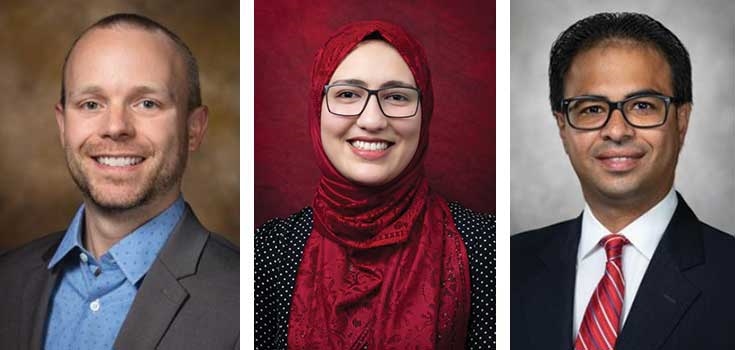In an article titled "Employing Faculty, Peer Mentoring and Coaching to Increase the Self-Confidence and Belongingness of First-Generation College Students in Biomedical Engineering," assistant professor Mostafa Elsaadany led a team of researchers including alumna Mona Ahmed and associate professor Timothy Muldoon to discuss their study of the impact that supportive faculty, peers and academic coaches can have on first-generation college students in the biomedical engineering field. In the study, participants were assigned to academic coaching, along with either faculty mentoring or peer mentoring.
Elsaadany enjoys the role he plays. For Elsaadany, helping students succeed is an important part of his work. In addition to teaching, in other major components of his duties, Elsaadany conducts pedagogical studies and engineering education research that aims to provide state-of-the-art education services to our students.
"I remember how stressful college can be," Elsaadany said, "particularly if you don't have the knowledge from your family and peer group of what to expect at college, which is typical for first-generation students. We want to keep all of our students engaged and prepared to meet the challenges that may occur as they get established as college students. We want them to have the confidence to succeed and the feeling that they belong to the biomedical engineering community."
The article lists several challenges which may occur for first-generation students, including lack of parental guidance, economic and social burdens, and isolation. Elsaadany points out that these challenges may include the feeling of lowered self-confidence, increasing the risk that the students may drop out. To reduce the drop-out rate among first-generation students, Elsaadany created a study to increase the success and retention by including academic coaching combined with faculty mentoring or peer mentoring. Pre- and post-questionnaires were given to participants to measure their confidence and feelings of belonging.
"Another issue for BMEG students is the fact that it is a multidisciplinary field," said Muldoon, co-author of the study. "Because BMEG requires the integration of several disciplines - science, technology, engineering and mathematics (STEM) - it may be more difficult for students to feel like they fit into a particular area. With STEM-tailored mentoring, we anticipated an increase in academic and professional success for these students, along with enhancing their self-confidence," Muldoon said.
The next step will be to prepare and submit a grant proposal seeking funding to continue offering this type of mentoring and academic coaching to additional students. "We want to continue to improve on what we learned in this study and to provide support for even more students as they join our department for their training in biomedical engineering," Elsaadany said.
"I am extremely appreciative of Drs. Elsaadany and Muldoon for their efforts in addressing this important issue as we seek to recruit and retain students from diverse backgrounds," said Raj Rao, professor and head of biomedical engineering. "Determining approaches to creating an inclusive learning ecosystem is important, and this study emphasizes the significance of peer mentoring as an approach for student success."
Mona Ahmed, a doctoral candidate at Pennsylvania State University, is a recent graduate of the U of A biomedical engineering program and first author of the study. View the abstract and manuscript.
More details about ongoing research and education programs in the Department of Biomedical Engineering can be found online.
Topics
Contacts
Christin R. Finney, website developer
College of Engineering
479-575-4173, crn002@uark.edu
